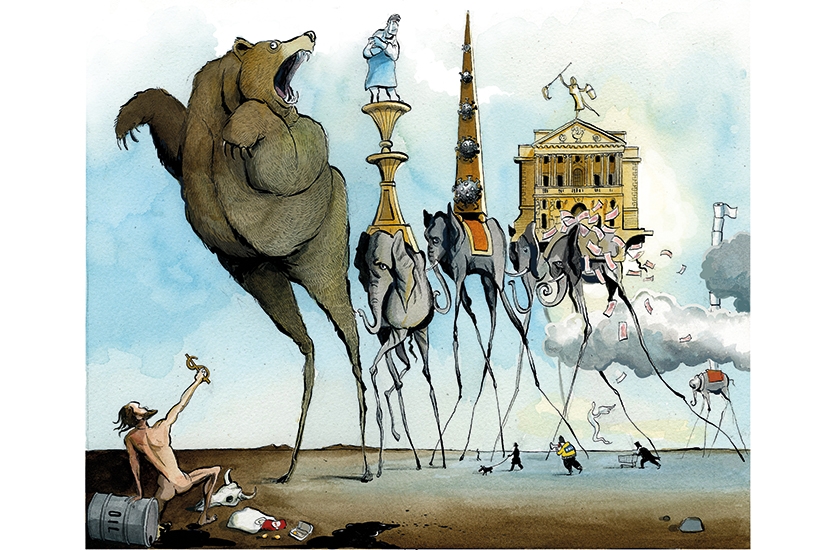We have seen crashes before, recessions and depressions, but nothing like this. Our fear of coronavirus has hindered and halted every aspect of daily life. We look out of our windows and barely recognise the country we’re in: police film dog-walkers and pour black dye into lagoons to deter swimmers. We wait in queues for empty-shelved supermarkets. The stock market collapses, surges, then collapses again. None of the old rules make sense. Welcome to the world of Coronomics.
If this were a normal recession, the remedy would be simple: encourage people to go out, spend money and boost the economy. But today’s public health concerns require the government to repress the economy, while trying to keep it afloat at the same time. Streets are quiet, hotels are empty, restaurants, pubs and high-street shops are shuttered. To tackle the virus, the economy must hibernate.
As Mervyn King has noted, economics is great at explaining what has happened — but struggles to explain what might now happen. Never has its crystal ball seemed murkier. Every economic analysis and projection made for this year and onwards has been torn to pieces. Economic forecasts look more like blind hope or open guesswork.
New attempts to turn around forecasts are relevant for hours, maybe days, before a new infection outbreak or multi-billion-pound stimulus package turns the most up-to-date calculations on their head. The new reality has destroyed our already limited ability to make economic forecasts. Now we’re all flying blind.
It’s near-impossible to keep up with this global catastrophe no one saw coming. The debate rages on as to whether our response to Covid-19 might be a gigantic false alarm, or if lockdown doesn’t go far enough. But from an economic perspective, either scenario — or something in between — doesn’t change what we’ve learned: when faced with a new virus, the reaction is to hunker down, in case it proves to be a killer. Global capitalism has developed a nervous tic, which will twitch every time there is a new virus. Lockdown will become a state we fear we could return to with almost no notice. We will have to organise our lives accordingly.
It’s no wonder HM Treasury has not released the estimated cost of all this – it has nothing to go on
All economic indications suggest that we’re midway through the sharpest economic contraction in history. Things will get worse before they get better. And while economists hope for a V-shaped recovery — that is a rapid downturn, followed by a rapid uptick in growth once the economy can resume normal activity — no one knows when ‘normal’ will be possible again. The world’s most advanced, liberal nations now range from giving serious guidance on limiting personal interactions to full-blown lockdowns which prohibit people from leaving their homes without permission. No world leader is in a position to take a punt and name an end-date for this way of life.
But the economic story of Covid-19 isn’t simply about shutdowns, lockdowns and downturns. Where the economy is still allowed to function, we are witnessing spectacular market adaptation: the reallocation of workers, resources and what little money we currently spend. This shake-up is unparalleled; nothing compares. It’s no wonder HM Treasury has not released the estimated cost of all this — it has nothing to go on.
Companies that once focused on jet planes and the intricate dynamics of F1 race cars have transformed themselves overnight into manufacturers of vital products. McLaren is doing its best to make more ventilators for the NHS; Mercedes worked with University College London engineers to produce a breathing aid to help keep patients out of intensive care units. The Scottish government has categorised distilleries as vital to the Covid-19 response because so many are now in the business of making hand sanitiser. Much of what is being created and distributed is on a non-profit basis, to supply the elderly and vulnerable with the prevention kit they need.
Where there is a surge in demand, it cannot always be met overnight. Local food companies such as Oddbox and Cook have had to limit orders because of demand overload, and it’s not just the little guys that can’t keep up. Ocado at one point told customers they were an absurd number in a queue to access the website. Now the company has had to put up a notice saying it just can’t cope. Elsewhere, Amazon temporarily closed its US ‘food pantry’ feature due to an influx of orders, and online delivery slots for the major supermarkets are taken for the foreseeable future. Families who had a recurring order slot are calling their friends, asking who would like some pasta.
Local corner shops and takeaways, which many would have passed by without any acknowledgement before, have become close to being the fourth emergency service in feeding local communities and providing essentials to keep households up and running. Those who work in them have seen their status transformed. People who were dubbed ‘low skilled’ a mere three months ago in the immigration reforms set out by the Home Office — shop workers, shelf-stackers, delivery drivers and cleaners — have joined the ranks of ‘key workers’ along with doctors and nurses, risking their safety to get us through the crisis.
This change in our perception of skill sets is being reflected economically as well. Not only has Amazon committed to hiring 100,000 new workers worldwide, but it has hiked wages in Britain by £2 per hour — a relatively dramatic increase in pay. Amazon has learned quite quickly the value of the labour of its warehouse and delivery people. And that seems to be a fair bit above what they were being paid.
Across the country — and the continent too — we’re seeing the fastest reallocation of labour since the second world war. The jobs market is suddenly offering hundreds of thousands of openings for store workers, customer service agents, pharmacy employees, doctors, nurses, delivery drivers, cleaners, online tutors. In the UK, where the Chancellor has sought to preserve jobs rather than expand unemployment benefits, companies are shifting people internally — as Marks & Spencer has done by moving staff in retail and clothing to its food shop floors. Abroad, workers in aviation and management are trading their wing pins and name badges for grocer and delivery kits.
At the end of all this, what will we have? The answer, alas, is mass unemployment. More than 200,000 Britons in hospitality and leisure lost their jobs in February and March, and most projections suggest that the number will keep climbing — from UK-wide unemployment at just under 4 per cent up to 6 per cent in the coming months. The immediate financial implications of Covid-19 will hit some much faster than others, yet the trade-offs made during the recovery process are going to be painful for all of us.
Some say Coronomics is socialism: the vast nationalisation of pretty much the whole economy. This is not so. In Britain, the government’s strategy is designed to ensure that there will be a market economy to come back to once this is over. The policies are lifeboats for private sector businesses and employees, who are suffering from a mandatory shutdown of all normal activity. But it’s very expensive, and the cost is taking us over the edge of what we know, into uncharted monetary and fiscal territory. The UK deficit, deemed to be under control just weeks ago, is now expected to hit 10 per cent of economic output: even more than at the peak of the 2008 financial crash.
Remember how nervous everyone was about printing money back then? All of the debates about whether this would lead to Zimbabwe-style inflation, or inflate the assets of the very rich? There has been no time for debate this round as the US Federal Reserve has scrapped any limits on money printing and bond purchases, pulling nearly every lever at its disposal to keep the economy afloat. The Bank of England has already decided to print £200 billion, using its digitally created money to buy government and corporate bonds — making interest on government debt artificially low. The Treasury plans to borrow £45 billion this month alone to help fund Covid-19 support. What will the long-term effects be? Is much-feared inflation now an inevitability? We’ll find out soon enough.
Rishi Sunak’s spending plans and giveaways were already on par with a Gordon Brown Budget — and that was before his colossal follow-up packages to support businesses, salaried employees and the self-employed through the Covid crisis. But while the spending is bigger, everyone is staying much quieter about the potential consequences. There’s a sense right now that no penny should be spared — but Coronomics, like any other kind of economics, is a study of scarce resources. That includes food, loo roll, hand sanitiser, and money.
A decade’s worth of austerity measures to get Britain’s spending under control has been wiped out in a matter of weeks, and the costs are still rising. The Institute for Fiscal Studies reckons Britain could return to normality with a budget deficit this financial year of £200 billion — or more. Whether the recovery begins in a few weeks or in six months, it is now inevitable that debt will skyrocket, possibly taking the UK up to a national debt peak of more than 100 per cent of GDP. This is precisely the outcome Britain spent an agonising ten years trying to avoid. When the Chancellor offered help to the self-employed, he also hinted that when this is over, their tax rates will rise. Coronomics has created a whole bunch of new precedents: one of them is that, in extremis, the state even bails out self-employed workers. From now on, it will have to charge them for this safety net.
This is perhaps the most dangerous point of all. The government has said it will catch all of these businesses and workers when they fall. But ministers have to borrow every pound that they are now offering in support. The whole response to Covid-19 is based on a pretty big assumption: that markets will keep on lending to the UK government so that it can do whatever is needed. But what if they don’t? What if the credit supply chokes up, and we’ve printed as much money as we dare? Right now, the strategy is to hope that this question never arises.
Solving the problems posed by Coronomics will take more than money, and the old playbooks — whether from the left or the right — are unlikely to do the job. The drive, innovation and resourcefulness which people are showing during this crisis must continue well into our recovery. But it will also take luck. If we’re lucky, this might not last for as long as is feared; a sudden medical breakthrough might limit the lockdown to weeks rather than months; the economy could come roaring back. Just as this disaster seemed to spring from nowhere, so too might the cure, which would confine Covid-19 — and its topsy-turvy economics — to the history books.
Now listen to Kate Andrews and Lionel Barber discuss Coronomics on The Edition podcast:
This article is free to read
To unlock more articles, subscribe to get 3 months of unlimited access for just $5








Comments
Join the debate for just £1 a month
Be part of the conversation with other Spectator readers by getting your first three months for £3.
UNLOCK ACCESS Just £1 a monthAlready a subscriber? Log in